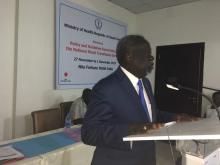WHO with support from Government of Japan strengthens blood transfusion services for safe, sustainable and quality blood in South Sudan
Juba, 1 December 2017: Every second, someone in the world needs blood. Blood transfusion is one of the therapeutic procedures performed during hospitalizations and undoubtedly helps patients who are injured, having surgery, receiving treatments or are being treated for diseases that affect the blood.
To promote the safety and accessibility of blood and reduce the risks associated with transfusion WHO collaborated with the Ministry of Health (MoH) to review National Blood Policy and Strategic Plan, adapt normative guidelines and standards and forms for the National Blood Transfusion Services from 27 November to 1 December 2017.
Over 40 participants (medical doctors, nurses, laboratory staff, donor recruiters and counsellors) from the regional Blood Transfusion Centres, Wau and Juba Teaching hospitals, Al Sabah Children’s Hospital, Military and private hospitals reviewed and updated the National Blood Policy and Strategic Plan documents; Guidelines for the appropriate clinical use of blood and blood products; blood donor selection criteria and donor medical history questionnaire; standards for the practice of blood transfusion in South Sudan; blood requisition, crossmatch request forms and register as well as the National Blood Transfusion logo.
Since the inception of the Blood and Transfusion Safety project based on voluntary non-remunerated blood donation in July 2014, the Blood Transfusion Services have been using the WHO’s generic guidelines. Adapting and developing donor selection criteria and other guidelines and standards documents in the context of South Sudan with fundamental principles and clear priority areas is vital to ensure a sufficient supply of safe blood and blood products to meet the needs of both the public and private hospitals.
Honorable Dr Riek Gai Kok, Minister of Health, expressed his gratitude to Japan and WHO for their commitment in supporting the roll out of the national blood transfusion services to other parts of the country to improve access to services and geographical coverage.
WHO making life saving blood available and safe
With funding from the Government of Japan, WHO supports the Ministry of Health to strengthen the National Blood Transfusion Services in South Sudan in the areas of voluntary unpaid blood donor recruitment and retention as well as capacity building to increase blood donations and improve availability to more hospitals in the country.
WHO’s support focuses on ensuring not only availability but safety of blood donated through testing for dangerous pathogens, ensuring appropriate blood cold chain storage and transportation facilities and training on the appropriate clinical use of blood and blood products, said Mr James Chitsva, Technical Officer for Blood Transfusion Safety.
“Blood transfusion safety is a critical intervention in the national health delivery system”, says Mr Evans Liyosi, WHO Representative a.i. for South Sudan. Promoting voluntary non-remunerated blood donation, and safe provision of blood and blood products is vital for the treatment of many life threatening situations that require blood transfusion. Mr Liyosi emphasized.
WHO is committed to support the Ministry of Health to develop a conducive policy framework, standards and guidelines to direct the implementation and roll out of the National Blood Transfusion Services to other regional, state and county hospitals as well as utilizing the mobile/virtual blood banks in situations where there is no electrical power and blood cold chain facilities.
Tel : +211 956 991 637
Email : chitsvaja [at] who.int (chitsvaja[at]who[dot]int)
Communications Officer
WHO Rwanda
Mobile: +250 795 450 856
Email: ebrahimj [at] who.int (ebrahimj[at]who[dot]int)



